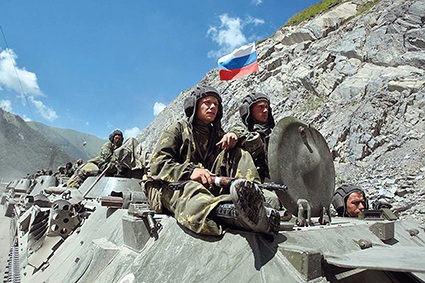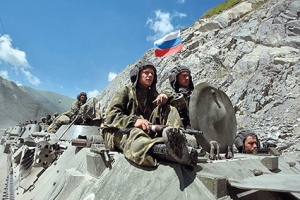Russian Responses to 10th Anniversary of August 2008 War
This week marks the 10-year anniversary of the 2008 Georgia-Russia War. International media outlets and political figures have been commenting on what preceded the conflict, the events from August 7-12, 2008, and its aftermath, including the continued Russian borderization of the administrative boundary line in Georgia’s Tskhinvali region.
Russian media and pundits have also marked the anniversary, with a significantly different perspective than Georgian and Western voices.
On August 7, Russian Prime Minister Dmitry Medvedev, who was President during the 2008 Georgia-Russia War, gave an interview to Russian media outlet Kommersant. In the interview, he discussed why Russian tanks did not enter the Georgian capital, what Moscow gained by recognizing the claims of the independence of Abkhazia and South Ossetia, and about what could provoke a new conflict in the region.
The August 2008 War “was not inevitable,” said Medvedev, blaming the conflict on “the irresponsible, immoral, criminal conduct of Saakashvili and his minions...and given the fact that the head of Georgia at that time was such an unbalanced person in a psychological sense...there was simply no other option [but to recognize Abkhazia and South Ossetia as independent]. Perhaps, if there had been a different leadership, it would have been possible to discuss something. But I am sure that different leadership simply would not have adopted such an ugly decision to attack the elderly and children, to attack Russian peacekeepers and, in fact, to declare war on the Russian Federation,” he said.
Saakashvili responded in an interview yesterday with Ekho Moskvy Radio, when he said “Medvedev is a zero. I thought I was dealing with the Russian President and it turned out that he was nothing, just a nonentity.” He also insisted that Medvedev was never a decision-maker, and then-Prime Minister Vladimir Putin really controlled the situation. Putin “attacked Georgia...to put a full stop to Georgia’s reforms. I was the symbol of reform for him,” opined Saakashvili.
When asked why troops did not enter Tbilisi, Medvedev disputed Saakashvili’s assertions about Russian aims, saying “the goal was to get the Georgian troops out of Tskhinvali, to put things in order, and to prevent the further escalation of violence...The goal was not to crush Georgia or execute Saakashvili. I believe that I did the right thing when I decided to show restraint and not force further actions.”
As to what Russia gained from the war, Medvedev said, “Russia got the main thing - peace. We were able to protect our citizens - many citizens of the Russian Federation live in Abkhazia and South Ossetia - and [to avoid] the headache that at some point there would be another attack...As a result, everything in the region is clear.”
Responding to NATO’s recent reiteration that Georgia will join the Alliance at some point in the future, Medvedev said, “NATO enlargement is an absolute threat to the Russian Federation...It's a threat to the world. We all understand that there is a certain tension in the territory of Georgia, that Georgia considers neighboring territories, or, from our point of view, states, as its own. It is an unsettled territorial conflict...And such a country, such a state will be admitted to a military bloc? Do we understand what this threatens? This can provoke a terrible conflict...beyond any doubt,” warned Medvedev.
In another interview with Kommersant, Sergei Ivanov, who was Vladimir Putin’s Vice Prime Minister in 2008 and previously Defense Minister, also pointed the blame at Saakashvili, saying that in 2007-2008, Washington and former Secretary of State Condoleezza Rice assured them that Saakashvili would not dare to escalate military conflict in South Ossetia. “In a private conversation, Rice told me that the US was not behind these events and that this was Saakashvili's initiative,” said Ivanov. After the war, Ivanov claims that Rice told him that Washington was “well aware that their satellite Saakashvili had violated all the conditions and crossed a red line,” that he had “gotten off his leash.”
Ivanov admitted that the Russian military developed a plan for conflict in so-called South Ossetia during his tenure as Defense Minister from 2001-2007, and expressed frustration that his plan was not upheld during the August 2008 War. “I can reveal one detail [of my plan],” said Ivanov, “it was stipulated that in case it become necessary to militarily intervene and force Georgia to peace on the territory of South Ossetia, only military units fully staffed by contract soldiers would enter. Not a single conscript was envisaged in this plan,” a plan which was supplanted by Anatoliy Serdyukov, Defense Minister during the war. Ivanov also blamed Russian losses, specifically of aircrafts, on “bad intelligence.”
Pushed on why Russian forces did not invade the Georgian capital, Ivanov said, “Because they did not intend to take it. What for? There was no political sense to it, nor military. We needed from the military point of view to inflict such a blow on the armed forces of Georgia that in the foreseeable future they could not repeat the same adventure.”
He also criticized Western media, “All the Western channels showed footage taken by correspondents from Russian TV channels in Tskhinvali. There were no other cameramen and journalists in Tskhinvali – no one. Our journalists captured the firing, the bombardment, the horrors of war. CNN and the BBC used this footage and replayed it endlessly, twisted it, placing the caption: ‘See how Russia attacked Georgia.’”
Ivanov insisted that the Georgian population agrees that Saakashvili was to blame for the war, despite much of the public opinion in Georgia pointing the finger at Russian aggression. “The subsequent reaction - even by Georgia and the Georgian population, who got rid of Saakashvili,” argued Ivanov, shows “that the majority of the Georgian population understands everything, but to recognize it aloud is again difficult because the territorial integrity has been lost by the state...We are not to blame for this...we kept our word, we recognized the territorial integrity of Georgia until the moment when it was impossible to do so any longer.”
By Samantha Guthrie












